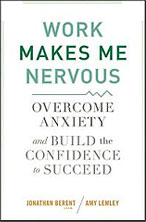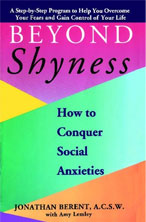Do you have Social-Anxiety?
Take this quick quiz. Check all that apply to you or your dependent.
[ ] You avoid social/ interactive situations because of uncomfortable feelings.
[ ] You panic (physically or emotionally) in social/interactive situations.
[ ] You worry excessively about what others will think of you.
[ ] You often say “I don’t have anything to say” or “I don’t know what to say”.
[ ] You are concerned about being noticeably nervous.
[ ] You have difficulty establishing relationships.
[ ] You experience feelings of loneliness and sadness.
[ ] You spend excessive time on the computer at the expense of socialization.
[ ] You overly depend on technology instead of directly interacting.
[ ] You have an over-dependence on family for socialization.
[ ] You fear intimacy (emotional or physical).
[ ] You avoid communication.
[ ] You’re over-dependent on substances (prescription or other).
[ ] You need alcohol to socialize effectively.
[ ] You suffer from learning disabilities.
[ ] You worry excessively about blushing or sweating.
[ ] You over-emphasize mistakes.
[ ] You have obsessive characteristics.
[ ] You are a perfectionist.
[ ] Your personality, generally speaking, is avoidant.
[ ] Your personality, generally speaking, is dependent.
If you checked four or more, it’s likely that social anxiety is present. If you checked more than five, you or your dependent have a substantial issue with social anxiety. The more symptoms you checked the more severe the problem.
Social anxiety disorder encompasses a spectrum of problems including the selective mutism -public speaking anxiety paradigm. Social anxiety itself occurs in many degrees, and has numerous manifestations including performance anxiety, fear of public speaking, selective mutism in children, adolescents, and adults, intimacy anxiety, and school phobia. In addition, social anxiety disorder can be a gateway to avoidant and dependent personality.
Social anxiety is based on performance dynamics. This is what separates it from other anxiety disorders. Anxiety is fear. When anxiety creates avoidance of the performance scenario a social phobia is present.
While there are many examples of social anxiety, a disorder which impacts individuals of all ages and cultures, there are two basic types of individuals who have the problem; individuals with and without “initiative”. “Initiative” does not mean ability. It means “the motivation to start up”, or “to get help or resolve the problem”.
In my clinical experience, which spans over 35 years and includes clinical work with social anxiety sufferers of all ages, I have seen everything from a total resolution to the problem, to the problem being permanent, and everything in between.
A crucial fact for those afflicted with social anxiety disorder, and for their loved ones, is the reality that the earlier there is productive help the more potential there is to resolve the anxiety before it becomes integrated into the personality and lifestyle. The perfect example of this is selective mutism in children, which is a profound example of social anxiety and social phobia at an early age. In addition it is a variation of obsessive compulsive disorder.
Click here to listen to a free library of interviews which includes a comprehensive picture of social anxiety and social phobia.
Click here to hear interviews with real people who have resolved social anxiety and social phobia.
Self-Help and Treatment Options
- Free Audio CD from Social-Anxiety.com
- Social Anxiety: The Untold Story
- Beyond Shyness: How To Conquer Social Anxieties
- Work Makes Me Nervous
- Comprehensive Self-Therapy Audio Program
- Public Speaking Anxiety Self-Therapy Audio Program
- “Warm Hands Cool Face” A Self-Help Clinical Program for Blushing Anxiety & Erythrophobia
- The Berent Method: High Performance Therapy for Social-Anxiety
- Telephone/skype therapy available worldwide
- Selective Mutism Seminar Audio CD/MP3 Program
- Self-Help Program for Parents of Children with Selective Mutism
- The Sociability Questionnaire
- Tip of the Month Club
- Social Therapy and The Learning Disabled
- Free Parent Addiction Survey


